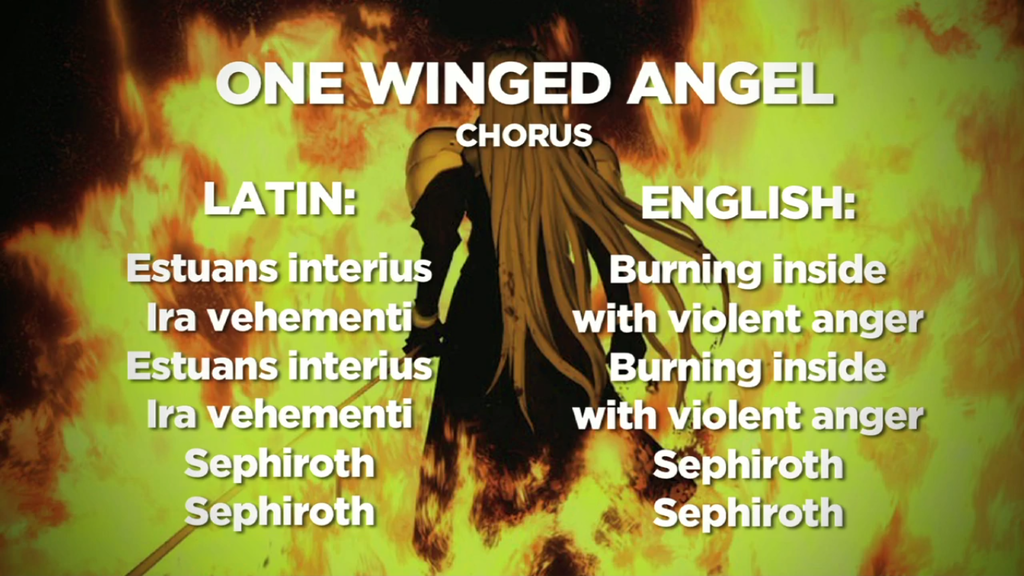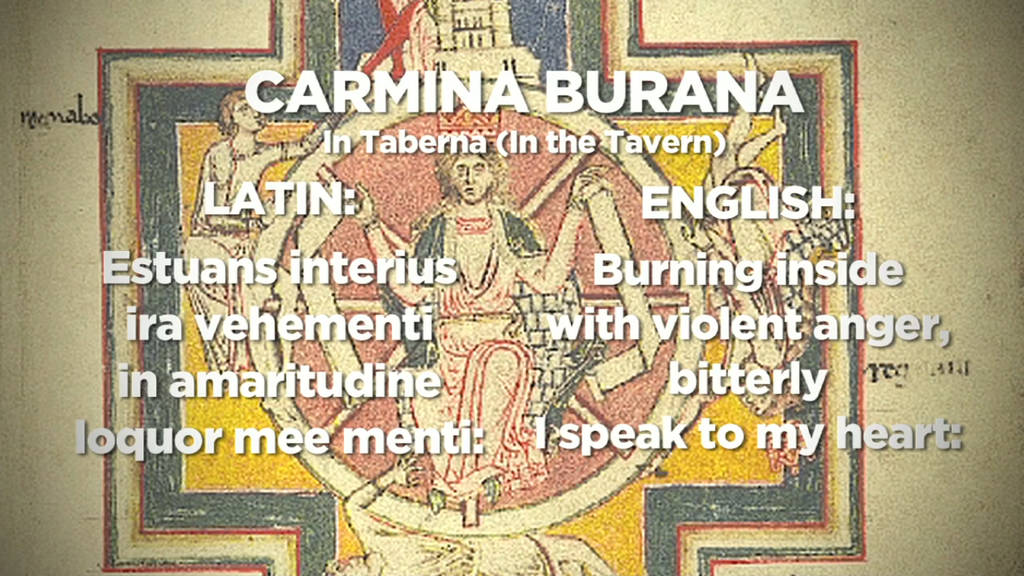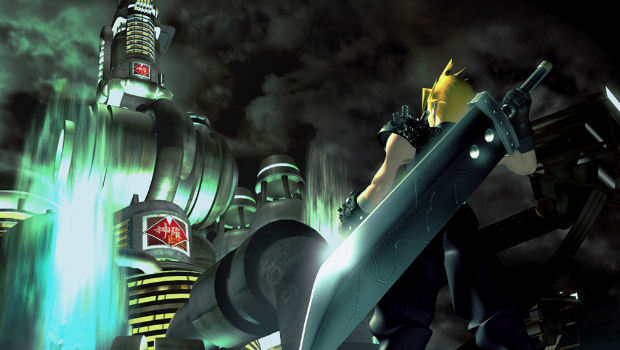
Eighteen years ago, Final Fantasy VII brought gamers on an unparalleled multi-disc journey. State of the art graphics showcased three-dimensional capabilities, memorable character arcs nestled in fan's hearts, and hundreds of hours flew by in front of television screens and PlayStation consoles. Fans still squeal in delight at the very sight of Cloud, eagerly embracing all FFVII news, whether it be his Smash Bros. appearance, a revamped game port to newer hardware, and/or a complete title remake. (Don't deny the squeals, own them. Wear your love loud and proud, my friends.)
In the midst of recent excitement and series updates, fans can still find fresh information of FFVII outside of big news announcements. To prove this point, I've gathered trivia about the original PlayStation release in 1997. Revisit the past for nostalgia feels and obscure knowledge. It may just hold you over between title releases.
1. Myth: Squaresoft originally intended for FFVII to release on the Nintendo 64.
Fans jumped the gun on this conclusion in 1996 after seeing Squaresoft's 3D proof of concept (shown in the video above). FFVII's former prospects as a Nintendo 64 release became common knowledge, despite one glaring problem: it isn't true. Silly Internet.
The demo video wasn't actually intended as a game proposal of any kind. In fact, you may have noticed that the featured characters come straight from Final Fantasy VI. This venture explored the practicality of 3D models for a SIGGRAPH presentation. Admittedly, the boss attacks do remind one of a certain weaponized companion, but that alone doesn't make this "fact" any more true.
However! FFVII was already in development during Squaresoft's 3D experiment. Originally, the fan favorite should have launched for the Super Nintendo in 1995. Squaresoft and Nintendo's relationship woes resulted in an inevitable break-up, making FFVII the developing company's final farewell gesture, but Chrono Trigger's own production blew up and temporarily halted FFVII in its tracks. Oh well. It's the thought that counts, right?

2. FFVII originally took place in New York City and starred a completely different hero.
Once upon a time, in a land without Shinra, Detective Joe prowled the mean streets of New York City for a lead. . .
Instead of the rebellious but lovable Cloud, gruff and hot-blooded Detective Joe starred as the title protagonist. If you don't already see the glaring similarities between this original proposal and the final product, nothing I can say will help you.
While the Final Fantasy franchise never spotlighted the vastly intriguing and originally named Detective Joe, Square didn't haphazardly toss out the idea. In fact, this concept went on to become the foundation for the survival horror RPG Parasite Eve.
3. One of the first scripts, considered too dark for the franchise, became the basis of Xenogears.
Remember when I said Squaresoft doesn't just trash ideas? Hold that thought.
Soraya Saga and Tetsuya Takahashi submitted one particular FFVII script without success. Squaresoft denied the script's too-dark nature for their established franchise. Before Saga and Takahashi's disappointment could feed their sense of glum, the script was instead greenlighted as the concept for an original title. The result, you ask? Why, that would be Xenogears.
Developers left a small tribute to Xenogears' origins in FFVII. After Cloud falls into the Lifestream and lands himself in Mideel's hospital, he offers the party a handful of nonsensical ramblings. Part of his mumbling includes "Xeno...gears..." in a creative burst of subtlety. He also misquotes lines from the song "Small of two pieces" by Yasunori Mitsuda, Masato Kato, and Joanne Hogg - a song featured in Xenogears.
Compare some of the eerily appropriate original lyrics to his fragmented thoughts in the video above:
"Broken mirror, a million shades of light
The old echo fades away
But just you and I
Can find the answer
And then, we can run to the end of the world
We can run to the end of the worldCold fire clenched to my heart
In the blue night
Torn by this pain, I paint your name in sound
And the girl of the dawn, with eyes of blues, and angel wings
The songs of the season are her only crown"

4. Real life tragedy shadowed FFVII in darkness after the producer and head writer's mother passed away.
The original transformation from a detective adventure story to the unsettling and deep tale we know today resulted from heavy lessons of morality at home. Hironobu Sakaguchi, the original game's producer and head writer, lost his mother during FFVII's development.
Sakaguchi sought a break from Hollywood-style deaths painted in the hues of nobility. His effort's to present something more shocking and raw led to Aerith's murder in a game-defining twist. Sudden loss and a feeling of heartbreak emanate from the scene, resurrection taken off the table to complete the realism behind the writing.

5. Neon Genesis Evangelion largely influenced FFVII.
The popular anime series stayed relevant to the game's development team. They pay tribute to its inspirational properties in-game. Examination of a background detail in the Gold Saucer amusement park reveals a 3D reproduction of Asuka Langley's D-Type Eva armor.

6. It turns out that Cloud didn't carry his massive sword using strange devil magic, but he did use magnets on his back.
Without a sheathe or any kind of basic harness in sight, you might have wondered: just how does our hero keep that blasted broadsword levitating against his back? Tetsuya Normura, Cloud's creator, answers this question in his character design sketches with the power of science. A magnet holds the Buster Sword in place, allowing for both an easy draw and convenient storage.
Let's pretend science also explains how the weight of that thing doesn't topple Cloud over. We'll just have to trust the strength of the magnet and Cloud's formidable sense of balance.

7. FFVII was the most expensive production of its time.
Final Fantasy VII cost a whopping $45 million to develop and produce. Adjusting to inflation translates that number to $65 million today. These kind of numbers were absolutely massive, especially for 1997's standards. FFVII featured the most impressive budget of its time, beating every other game to date during its initial launch.

8. The seventh installment in the franchise introduced the first show of diversity with the character Barret.
In case you never noticed, Final Fantasy isn't exactly a racial melting pot. Technically, Final Fantasy VI did incorporate one character of African descent, a.k.a. Leo Christophe. He can't hold a candle to Barret's claim, however, seeing as how his sprite's light skin tone doesn't make his darker profile picture. To make matters worse, poor Leo only gets one battle before dying.
Barret thus stars as the series first fully developed black character. Clearly, he wasn't without stereotypes, and I am by no means praising every facet of his representation. This was no mastering of racial sensitivity, but it was more diversity than the franchise had seen to date.
9. FFVII also introduced voice acting to the franchise.
Players dealt with dialogue boxes alone until Final Fantasy releases on the PlayStation 2. There exists but one exception to this otherwise straightforward timeline. A lone, uncredited actor announces the oncoming release of the Sister Ray in Midgard in FFVII. Exciting stuff, no? The video should refresh your memory, if you haven't gone ahead and hit play already.

10. Oh dear lord, the Honeybee Inn was supposed to even sketchier.
Thanks to 1997 technology, content ultimately cut from FFVII gameplay remains unused and unloved on the game discs. A dig into this dummy data reveals changes made to the Honeybee Inn that toned it down a notch or two. If you didn't think the brothel that hosted Cloud's cross-dressing extravaganza could get worse, you'd be mistaken.
Notable originals to the scene and location include:
- Even more girls/"bees"
- More racy pictures decorating the fine establishment
- A patron and pervy thief who not only acquired Tifa's panties somehow, but generously gives them to Cloud
- An additional cutscene requiring Cloud to pester a girl for her underwear, because apparently Tifa's simply isn't enough
Only one question remains: Why?

11. American and Japanese versions of FFVII don't match up, featuring 4 notable differences between the two.
Before you make a wise crack regarding the obvious difference in language, I'm referring to changes that went beyond translation. In the English version of the game:
- Enemy encounter rates dropped
- New bosses appear (i.e. the Ruby and Emerald Weapons)
- Additional cutscenes illuminated Cloud's backstory
- Extra scenes were also added to clear up the game's ending

12. Aerith called dibs on casting Holy in NPC mode and for the first time, players couldn't use that magic in battle.
Aerith (not the mistranslated "Aeris") uses the standard white magic spell Holy from previous franchise titles to stop Meteor. That's what the ever-crucial White Materia represented, anyway. Here's the interesting part: FFVII stands alone in keeping Holy set aside for NPCs only. Every previous Final Fantasy game included the spell as an in-battle option, but Aerith alone had access to the death-defying magic in FFVII.
Interestingly enough, the American version translated "Holy" properly for the first time in this game as well. Prior to the release of the seventh installment, the Nintendo of America cried out in anxious fear at the thought of using any sort of religious reference. Holy was instead called "Fade," "White," and "Pearl" in the United States.

13. "One-Winged Angel" was inspired by a Latin cantata.
Kotaku video editor Chris Person created a side-by-side comparison of FFVII's "One-Winged Angel" and the Latin cantata "Carmina Burana." The similarities are haunting, to say the least, due to the fact that the cantata largely influenced the very dangerous, very creepy, and deeply psychotic Sephiroth's theme music.
The Kotaku exclusive video adds a crucial audio component to the comparison that simply can't be recreated in text alone, but two screenshots introduce a compelling examination:

VS

Let the nightmares commence.
14. Speculation STILL surrounds the death of Aerith and whether or not her death was set in stone.
Not everyone could deal with the demise of fictional Aerith in a healthy, composed fashion, including those who couldn't accept her death at all. Some of the more tech-savvy gamers hacked the original FFVII game to continue playing as the lost heroine.
That's when things started to get a little weird (weirder than hacking a dead girl back to life, that is). Aerith actually speaks at separate intervals beyond her point of death, evidence of pre-programmed lines in-game.
Fans took this evidence and developed it into separate theories, namely that Aerith was, at some point, meant to be revived, or that she had never been killed at all in the original story arc. The lack of originality in her lines have also been taken to indicate their spot as placeholders until finalization of the story occurred.
Tetsuya Nomura wouldn't feed these hopeful thoughts at all, if you can help it. He explains:
"The world was expecting us to bring her back to life, as this is the classic convention. But we did not. We had decided not to do this from the beginning."
Nomura's words don't quite bridge the gap between clearly existing dialogue for an already dead Aerith and a supposedly pre-determined, final death. Fans get to personally decide what to believe on this one.

FFVII stands as a hallmark title in video game history. Its popularity may not be made or broken with trivia, but feeding your game-love never hurt anybody either.
Remember to continue biding your time wisely between those exciting FFVII releases. When you begin to feel impatient and need a FFVII pick-me-up, just remember: Cloud was almost a New York detective named Joe.
Were you surprised or intrigued by any new information? Is there a burning question deep in your heart you'd ask one of the original developers if given half the chance? Have your thoughts on Aerith's death changed at all given in-game dialogue? Share, discuss, and theorize. Shinra wouldn't like it if you did, and it's always a good day when you can thoroughly displease them.







Published: Dec 10, 2015 07:55 pm